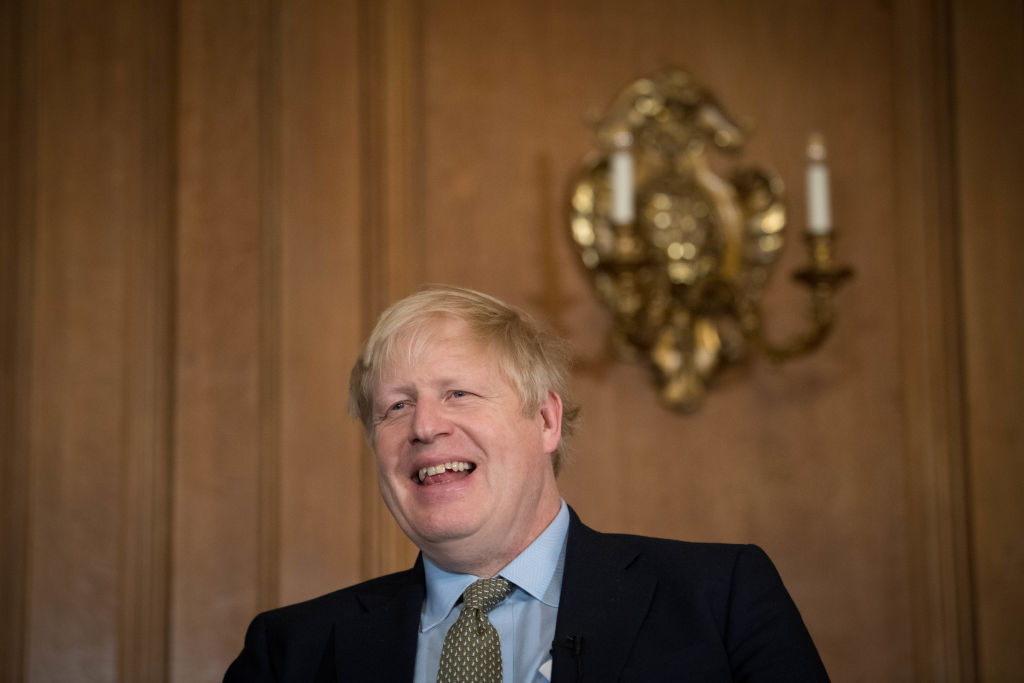The Real Class War Is Being Waged from Above
While key workers facing poverty are being told to accept wage cuts, Downing Street is lifting pay caps for bankers. There’s class war alright – but it’s being waged by the elite.

Prime Minister Boris Johnson laughs as he takes part in a panel event and reception at Downing Street in March 2020. (Stefan Rousseau / WPA Pool / Getty Images)
This week, a poll showed that young people have no faith in establishment figures like politicians. The news came as no surprise to us at No Holding Back. Young people increasingly get their news from social media platforms like TikTok, and many of us, not just young people, long ago abandoned mainstream media outlets as trustworthy sources of information. This distrust in the mainstream press is part and parcel of a distrust in the establishment politicians whose interests it increasingly represents.
The circulation figures for such newspapers are in freefall. This decline in readership has come alongside a rapid movement away from any pretense at objective reporting. There are occasional honourable exceptions, but more often than not the front pages are used to attempt to persuade readers, rather than to inform them.
Two front pages this week, in light of the RMT’s huge rail strike, displayed this process in action. These front pages, rather than telling us objective information, revealed the state of Establishment opinion and the panic that appeared to be setting in as the voices of rail workers were starting to be heard.
One of the Murdoch papers—you know the one, the tabloid people in Liverpool don’t buy—produced a full front-page spread based around the words ‘Class War’.
This paper, just like many of its supposed competitors, appeared furious that workers belonging to trades unions should vote by an overwhelming majority to take industrial action if negotiations break down. It would be naïve to think this opinion applies to railway workers alone: this summer, it seems increasingly likely that a number of different sectors of the British economy will be subject to industrial action, and the mainstream press is likely to treat each subset of workers with contempt in turn.
For instance, the tabloid used the expression ‘Class War’ in part as a play on words, since the teaching unions are also considering action. But it got at a real fear drumming at the heart of the establishment—that there is indeed a kind of class war emerging in Britain, as the organised working class—first the RMT, and then others—begins to move into action.
A clue to whether or not that fear is founded might be gained by looking at the front page of a second newspaper on the same day, Wednesday. Before we turn to that story, though, we should recall that there are thirty-three million people in our country who work either for a wage or a salary, and that since the crash of 2008, their average income has been in long-term decline. Between the crash and the start of Covid, taken together, working people lost £433 billion in predicted earnings.
This long-term spiral has accelerated in recent months as the cost of living crisis has begun to bite. Not only the Bank of England governor but the whole governing class have lectured workers on the need to exercise ‘pay restraint’, despite the fact that there is clear evidence of millions of people falling into poverty. In April, a survey found that 7.3 million people are in food insecurity, including 2.6 million children. This is before the further £800 hike to energy bills set to take place this October, and with inflation still predicted to hit 11 percent this year.
Meanwhile, the growth in executive pay is accelerating away in broad daylight. This brings us to our second headline: in the middle of the rail dispute, and alongside ministers telling public sector workers to tighten their belts, the i reported that ‘Downing Street has asked ministers to ease restraints on top City pay to show overseas companies “benefits of Brexit” and boost the UK finance sector’.
The Prime Minister preaches pay restraint when it suits him—just not for City Fat Cats. In a cost of living crisis, the priority of the leader of our country is increasing the wealth of bankers while his boot boys in the Cabinet menace hard-working trades unionists.
At No Holding Back, we have regularly pointed out the gross inequality which has been allowed and encouraged to skyrocket during the years of neoliberalism. This injustice—lectures on pay restraint for low-paid key workers; scissors to the red tape for the wealthiest—is not an anomaly. Those who work by hand or by brain have constantly and repeatedly lost out, and the rich have seen their wealth skyrocket; during the Covid pandemic alone, the richest 250 people in the country increased their wealth by an eye-watering £106 billion.
So what does this tell us about the paper’s accusations of class warfare? For the truth, we should turn, surprisingly, to one of the richest men in the world, Mr Warren Buffett, who once declared that: ‘There’s class warfare, all right, but it’s my class, the rich class, that’s making war, and we’re winning.’
Buffett’s analysis is right. We agree with it. The rich elite have launched a class war against the rest of society, against the vast majority. We cannot allow ourselves to simply remain under attack. The fight back requires us to continue to act the way the RMT have taken action this week, and to continue to speak out in solidarity with all those working people whose standards of living are under siege from the wealthy few.
The pandemic made it clearer than ever which side we have to be on—the side of the key workers who kept the country running during those terrible years, and who are now having that vital contribution thrown back in their faces. It is an affront. It is time to stand up.